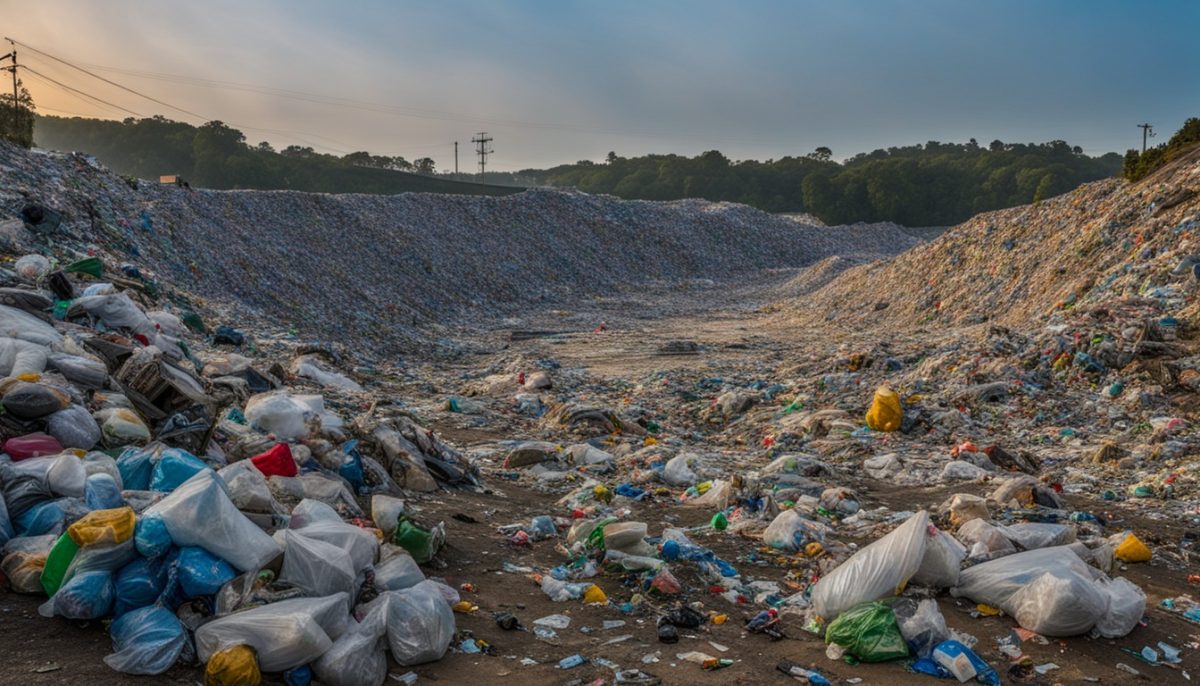
Welcome to the first section of our article, where we delve into the detrimental impact of cheap rubbish on the recycling industry and its implications for sustainable waste management practices. In recent years, the rise of subpar waste has posed a significant threat to the recycling industry, challenging its very existence.
The influx of cheap rubbish presents numerous challenges for recycling facilities and waste management practices. As recycling facilities are designed to process and recycle high-quality materials, the presence of low-quality waste disrupts their operations, hampers efficiency, and compromises the effectiveness of recycling processes.
This influx of cheap rubbish and its impact on the recycling industry has far-reaching economic consequences as well. The dominance of low-quality waste in the recycling market leads to a decline in prices, making it difficult for recycling businesses to compete. This financial instability can ultimately jeopardize the viability of recycling operations, leading to potential closures and unemployment.
Despite these challenges, there are solutions and strategies that can help sustain eco-friendly waste management practices. In the next section, we will explore innovative approaches, governmental interventions, and individual responsibilities that can support the recycling industry and ensure a sustainable future for waste management.
The Rise of Cheap Rubbish: A Threat to Recycling
As the demand for cheap products continues to rise, so does the production of cheap rubbish, posing a significant threat to the recycling industry. The proliferation of low-quality waste, coupled with challenges faced by recycling facilities, has created a crisis that jeopardizes our efforts towards sustainable waste management practices.
The Influx of Low-Quality Waste
The rise of cheap rubbish can be attributed to several factors. One of the main contributors is the global shift in manufacturing and production to countries with lower labor costs. While this has led to affordable consumer goods, it has also resulted in an increase in subpar materials that end up as waste.
Furthermore, the rise of e-commerce and online shopping has fueled the growth of cheap rubbish. As consumers opt for convenience and competitive prices, the packaging and shipping of products often prioritize cost-efficiency over environmental sustainability.
This influx of low-quality waste poses significant challenges to recycling facilities. The recycling process works best when materials are consistent in quality and composition. However, with the rise of cheap rubbish, the variety of materials and their inconsistent quality make it difficult for recycling facilities to effectively sort and process the waste.
Disrupting Recycling Operations
The presence of cheap rubbish disrupts the operations of recycling facilities in multiple ways. Firstly, the low quality of these materials hampers the recycling process, as it requires additional effort, resources, and time to separate and treat them.
Secondly, the abundance of cheap rubbish lowers the demand for recycled materials. When the market is flooded with low-cost alternatives, the demand for recycled products decreases. As a result, recycling facilities struggle to find buyers for their processed materials, impacting their revenue and overall viability.
Lastly, the disposal of cheap rubbish creates a burden on landfill capacities. In some cases, recycling facilities may be forced to divert resources towards waste disposal instead of recycling, further hindering their ability to fulfill their primary purpose.

In conclusion, the rise of cheap rubbish presents a grave threat to the recycling industry. Its increasing presence, coupled with the challenges faced by recycling facilities, undermines the effectiveness of sustainable waste management practices. To overcome these challenges, it is crucial to address the root causes of cheap rubbish production, promote responsible consumption, and invest in recycling infrastructure that can handle the complexities of low-quality waste. Only through collective efforts can we ensure a future where recycling thrives and our environment is protected.
The Economic Consequences of Cheap Rubbish
As the recycling market grapples with the pervasive presence of cheap rubbish, the economic consequences are becoming increasingly apparent. The waste industry, once considered a profitable and sustainable sector, now faces significant challenges that threaten its viability.
The influx of low-quality waste at rock-bottom prices has disrupted the recycling market dynamics. Recycling businesses find it difficult to compete with the low price point of subpar waste, leading to financial instability and potential closures.
Recycling facilities rely on a robust and steady supply of recyclable materials to sustain their operations. However, the dominance of cheap rubbish has created a disparity in the recycling market. Consumers and businesses are drawn to the affordability of inferior waste, hindering the flow of quality recyclables.
This disruption strains the waste industry’s ability to generate revenue and maintain profitability. Recycling companies struggle to cover their operating costs, including collection, sorting, processing, and transportation expenses. Ultimately, the profitability of recycling businesses is compromised, casting doubt on their sustainability.
Moreover, the economic consequences extend beyond individual recycling businesses. The waste industry plays a significant role in job creation and economic growth. With financial instability and potential closures, the livelihoods of workers employed in the sector are at stake.
The recycling market’s economic downturn not only impacts businesses and workers but also compromises broader environmental and sustainability goals. Without a thriving waste industry, the efficient diversion of waste from landfills and the promotion of circular economies become increasingly challenging.
Amidst the prevalent economic consequences, it is crucial to recognize the urgent need for intervention and support to protect the recycling market and the waste industry. Innovative solutions and collaborative efforts are essential to reestablish a sustainable and economically viable recycling ecosystem.
Advocating for Policy Changes
The government must play a pivotal role in addressing the economic consequences of cheap rubbish. Policy changes are necessary to create a level playing field for the waste industry by implementing regulations that discourage the production and disposal of low-quality waste.
Investing in Recycling Infrastructure
Investments in advanced recycling infrastructure can help boost the competitiveness of recycling businesses. Upgrading sorting and processing technologies can enhance efficiency and reduce operational costs, facilitating improved financial performance.
Empowering Consumer Education
By educating consumers about the economic, environmental, and social benefits of supporting the recycling market, we can foster behavioral changes that prioritize the purchase of quality recyclable products. Consumer demand for sustainable and responsibly sourced materials can stimulate the growth of the recycling industry.
| Economic Consequences | Recycling Market | Waste Industry |
|---|---|---|
| Financial instability | Disrupted dynamics | Job creation |
| Potential closures | Decreased profitability | Environmental goals |
| Reduced flow of recyclables |
Sustaining Eco-Friendly Waste Management Practices
In the face of ongoing challenges posed by the prevalence of cheap rubbish, it is crucial to find sustainable solutions for eco-friendly waste management. The recycling industry must adapt and innovate to ensure a greener future.
One promising approach involves embracing innovative technologies that can sort and process waste more efficiently. By investing in state-of-the-art machinery and systems, recycling facilities can increase their productivity while minimizing the environmental impact. These advancements not only improve waste management practices but also contribute to the overall sustainability of the industry.
In addition to technological innovations, governmental interventions play a crucial role in sustaining eco-friendly waste management. Governments can implement policies and regulations that discourage the production and consumption of cheap, low-quality products. By promoting extended producer responsibility and incentivizing eco-conscious practices, authorities can create a conducive environment for a more sustainable waste industry.
However, sustainable waste management is not solely the responsibility of governments and businesses. As individuals, we can contribute to the cause by practicing responsible consumerism and adopting conscious waste disposal habits. By reducing, reusing, and recycling, we can minimize the amount of waste that ends up in landfills and support the recycling industry’s efforts.
By combining innovative technologies, governmental support, and individual action, we can build a future where eco-friendly waste management practices prevail. It is time to recognize the importance of sustainable solutions and work together to ensure a cleaner and greener planet for generations to come.
